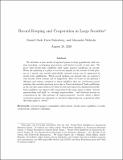Record-Keeping and Cooperation in Large Societies
Author(s)
Clark, Daniel; Fudenberg, Drew; Wolitzky, Alexander
DownloadAccepted version (1.219Mb)
Open Access Policy
Open Access Policy
Creative Commons Attribution-Noncommercial-Share Alike
Terms of use
Metadata
Show full item recordAbstract
<jats:title>Abstract</jats:title>
<jats:p>We introduce a new model of repeated games in large populations with random matching, overlapping generations, and limited records of past play. We prove that steady-state equilibria exist under general conditions on records. When the updating of a player’s record can depend on the actions of both players in a match, any strictly individually rational action can be supported in a steady-state equilibrium. When record updates can depend only on a player’s own actions, fewer actions can be supported. Here, we focus on the prisoner’s dilemma and restrict attention to strict equilibria that are coordination-proof, meaning that matched partners never play a Pareto-dominated Nash equilibrium in the one-shot game induced by their records and expected continuation payoffs. Such equilibria can support full cooperation if the stage game is either “strictly supermodular and mild” or “strongly supermodular,” and otherwise permit no cooperation at all. The presence of “supercooperator” records, where a player cooperates against any opponent, is crucial for supporting any cooperation when the stage game is “severe.”</jats:p>
Date issued
2021Department
Massachusetts Institute of Technology. Department of EconomicsJournal
Review of Economic Studies
Publisher
Oxford University Press (OUP)
Citation
Clark, Daniel, Fudenberg, Drew and Wolitzky, Alexander. 2021. "Record-Keeping and Cooperation in Large Societies." Review of Economic Studies, 88 (5).
Version: Original manuscript